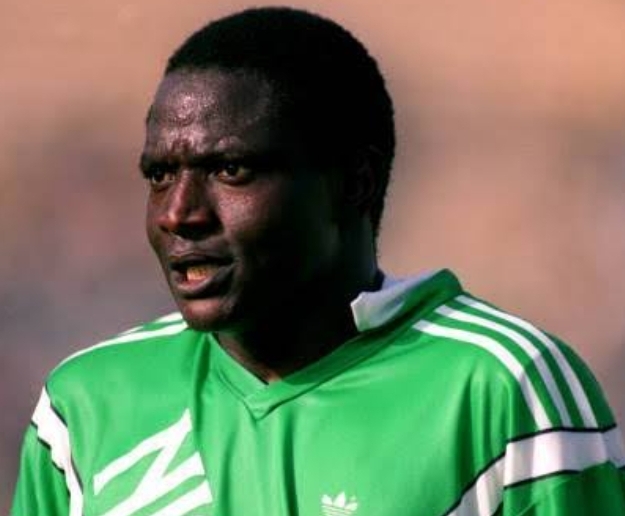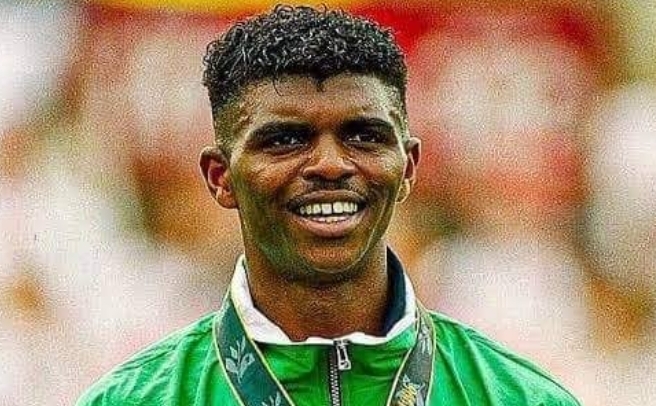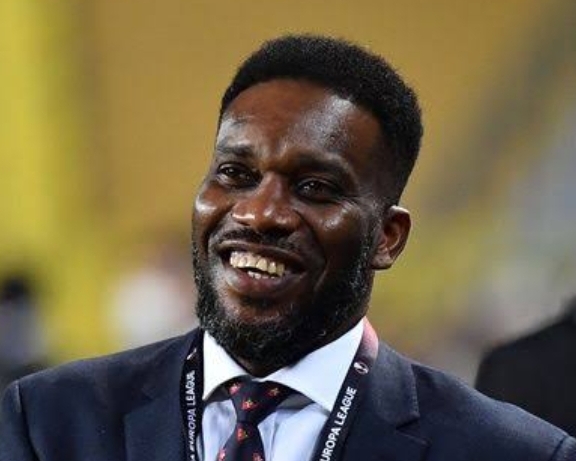Rashidi Yekini Biography: Education, Career, Spouse, Achievements, Net Worth, Age 2025

Rashidi Yekini is remembered as one of the greatest football players that Nigeria has ever produced. His name is written in history as the man who gave Nigeria its first ever World Cup goal, a moment that filled millions of Nigerians with pride. His life story is one of humble beginnings, great achievements, and also challenges that shaped who he was both on and off the football field. Yekini’s journey shows what determination, natural talent, and belief can do even when life seems hard. From the dusty fields of Kaduna to the biggest football stage in the world, his story remains an inspiration to many people in Nigeria and beyond.
Rashidi Yekini Early Life and Family Background
Rashidi Yekini was born on 23 October 1963 in Kaduna, Nigeria. Even though he was born in Kaduna, his family originally came from Offa, a town in Kwara State. His father was Alhaji Yekini and his mother was Alhaja Sikirat Yekini. They were Muslims and raised Rashidi and his siblings in the Islamic faith. The Yekini family lived a modest life and did not have much money. Rashidi had brothers and sisters, but their names were not widely known because the family preferred to stay private.
Growing up, Rashidi’s childhood was not easy. He had to work different small jobs to support himself and his family. He worked as a welder, a mechanic, and sometimes carried heavy loads just to earn money. These struggles toughened him and taught him responsibility at a young age. Despite the hardships, Rashidi discovered football early in life. He would play barefoot with friends in the neighborhood, using improvised balls. Football became more than just a game for him. It became a passion and an escape from the difficulties of his early life.
Read Also: Jay-Jay Okocha Biography: The Legendary Journey of Nigeria Dribbling Maestro
Education
Rashidi attended primary and secondary schools in Nigeria, but his formal education did not go very far. This was because his heart was set on football, and his talent was too big to be ignored. He spent most of his time chasing his dream of becoming a professional player. While education was important, his parents noticed that football was clearly his calling. In those days, many parents were afraid that their children might not succeed through sports, but Rashidi’s skills soon convinced everyone that he was destined for greatness.
Early Career in Nigeria
Yekini began his football career with UNTL Kaduna, a small club that gave him the opportunity to show his raw talent. From there, he joined Shooting Stars Sports Club of Ibadan in 1982. His time at Shooting Stars was explosive. In the 1983 season, he scored an incredible 45 goals in 53 matches, a record that shocked the Nigerian football community. His reputation as a deadly striker grew quickly, and fans began to follow his career closely.
After his success at Shooting Stars, Yekini moved to Abiola Babes, another Nigerian club, where he continued to shine. His consistent performances and goal-scoring ability soon attracted attention from outside Nigeria.
International Career
In 1987, Rashidi Yekini moved to Ivory Coast to play for Africa Sports National. This was a turning point in his career because it exposed him to more competitive football outside Nigeria. He scored many goals for the club and became a top striker in West Africa. His success in Ivory Coast also earned him wider recognition, and in 1993 he won the African Footballer of the Year award, becoming the first Nigerian ever to achieve this honor.
In 1990, Yekini moved to Portugal to play for Vitória de Setúbal. This period is remembered as the best phase of his club career. In the 1993–94 season, he finished as the top scorer in the Portuguese league with 21 goals. Fans in Portugal loved him because of his strength, speed, and powerful finishing. He became one of the most respected strikers in the league.
After his success in Portugal, Yekini had spells in different countries. He played in Spain for Sporting Gijón, in Greece for Olympiacos, in Switzerland for FC Zürich, and in Saudi Arabia for Al-Shabab. He later returned to Nigeria to play again for Shooting Stars and also Julius Berger. No matter where he played, his ability to score goals followed him, and he became known worldwide as a dangerous striker.
National Team Success
Rashidi Yekini’s biggest impact was with the Nigerian national team, the Super Eagles. He represented Nigeria from 1984 to 1998, scoring 37 goals in 58 appearances. This record makes him the highest goal scorer in Nigeria’s football history, a record that still stands.
One of his most iconic moments came at the 1994 FIFA World Cup in the United States. Nigeria was playing in its first ever World Cup, and in the opening match against Bulgaria, Yekini scored Nigeria’s first World Cup goal. His celebration, where he held the net and cried tears of joy, became a legendary image in football history.
That same year, Yekini helped Nigeria win the Africa Cup of Nations in Tunisia. He finished as the top scorer and was named the best player of the tournament. His leadership and goals inspired the team and brought glory to Nigeria. He also played in the 1998 World Cup in France, although younger players had begun to take center stage by then.
Playing Style and Personality
Rashidi Yekini was a striker known for his strength, powerful shots, and determination. He could shoot with both feet, was strong in the air, and always knew how to find space to score. Fans loved him because he played with passion and gave his all in every match. Off the pitch, he was known as a humble, quiet, and generous man. He was not the type who liked attention or luxury. Instead, he lived a simple life and focused on his family and faith.
Achievements
- Became the first Nigerian to win the African Footballer of the Year award (1993).
- Top scorer in the Portuguese league in the 1993–94 season.
- Scored Nigeria’s first ever World Cup goal in 1994.
- Won the Africa Cup of Nations with Nigeria in 1994, finishing as the top scorer.
- Nigeria’s all-time top scorer with 37 goals.
- Scored over 500 career goals across clubs and national team.
Personal Life and Family
Yekini was married to Patricia Yekini, and together they had children. He was a private man who preferred to keep his family away from the spotlight. Friends and neighbors described him as generous, gentle, and deeply spiritual. Despite being a national hero, he always carried himself with humility and kindness.
Net Worth
During his career in Europe and the Middle East, Yekini earned good money. He invested in houses and businesses, particularly in his hometown of Offa and in Ibadan. At the height of his career, he was among the highest-paid Nigerian players. However, like many footballers of his generation, managing money after retirement was difficult. Reports suggested that his net worth at the time of his death was estimated between 500,000 and 1 million dollars.
Later Years and Death
Sadly, Yekini’s later years were filled with challenges. After retiring from football, he became more isolated and was said to be battling mental health issues. Reports described him as living a lonely life, avoiding the public, and struggling with depression. These struggles made his final years very difficult.
On 4 May 2012, Rashidi Yekini passed away at the age of 48. His death shocked Nigeria and the football world. Some reports claimed he had been ill for some time, while others said he had not been properly cared for. He was buried in his hometown of Offa according to Muslim rites. His death left millions of fans in sorrow, but his legacy continues to inspire.
Legacy
Rashidi Yekini’s story is the story of a man who rose from humble beginnings to become a legend. He gave Nigerians some of their happiest football memories, especially that unforgettable World Cup goal in 1994. His record as Nigeria’s top scorer, his achievements in club football, and his personality make him a role model for younger players.
Even after his death, Yekini’s name is still mentioned whenever Nigerian football is discussed. For many fans, he remains the symbol of passion, determination, and national pride. His journey reminds us that greatness can be achieved with hard work and dedication, no matter where one comes from.



